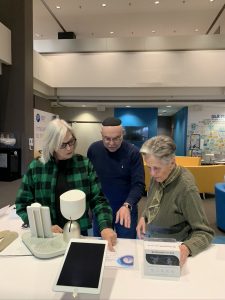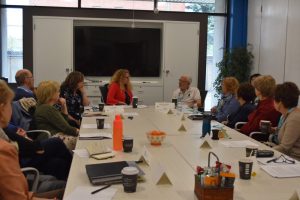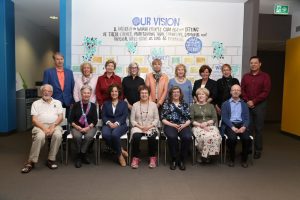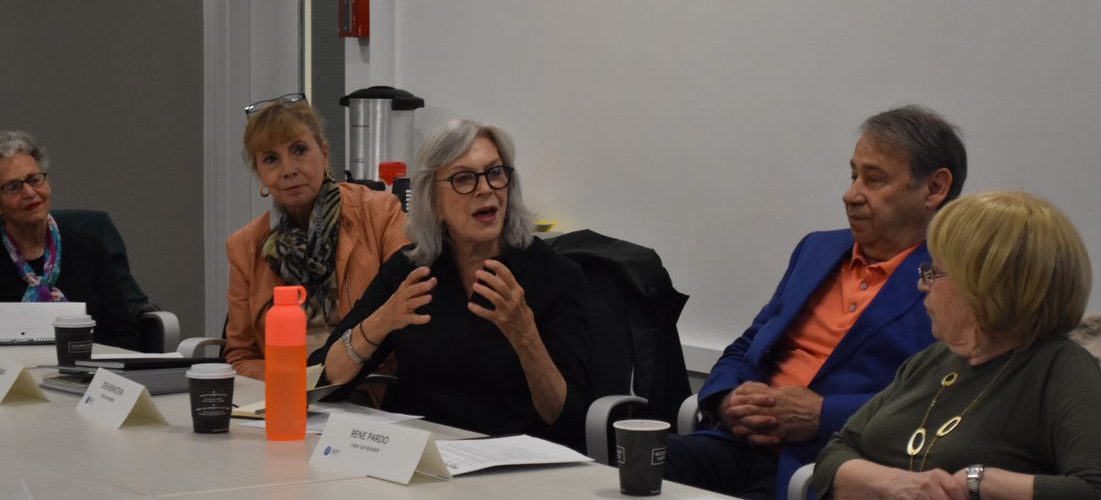
SAP members (from left to right) Deborah Bernstein, Sam Herskovits and Rachel Schlesinger browsing through the CABHI innovation space.
Every great idea needs a sounding board. Innovative aging and brain health solutions are no different. As the number of Canadians with dementia-related diseases continues to rise, it’s important that we create opportunities for solutions in the longevity sector to be tested and validated so they can become available to those in need[i].
End-user validation – or feedback from the potential beneficiaries of a product or service – can help innovators successfully market their ideas. To help innovators gain access to this valuable resource, the Centre for Aging + Brain Health Innovation (CABHI), powered by Baycrest, has joined together with a group of dedicated seniors to form a Seniors Advisory Panel (SAP) of individuals with lived experience. As older adults and caregivers, panel members provide insight into the challenges innovators should aim to address when developing their product or service.
Walter Seaton, one of the Seniors Advisory Panel’s founding members, spoke to CABHI about the role of the SAP and how the group is helping to accelerate solutions aimed at improving the lives of older adults.
Q : How did you get involved with the SAP?
A: In 2016 CABHI invited me to join a new initiative involving older adults in the community. I was privileged to join what is now known as the Seniors Advisory Panel as one of its founding members. Over the course of four years, I’ve witnessed the SAP expand to 18 members. We come from a variety of professional backgrounds including nursing, television production, social work, business, governance and risk management consulting.
I myself am a professional engineer with over 45 years of experience. I began working with some of the first computer models in 1967. These are qualities that have allowed me to make valuable contributions to the review of innovations, many of which are becoming more technical in nature.

SAP meeting with an innovator
Q: What makes the SAP different from other end-user panels?
A: The thing that makes the SAP unique is that many of us are older adults ourselves (most of us are between 65 and 90 years of age). We work with CABHI to provide innovators feedback on products and services from the perspective of the older adults and the caregivers that will benefit from them the most.
Q: In your opinion, why is end-user validation so important to the innovation process?
A: As a member of the SAP I can see the value that our feedback provides to innovators. We know that they are grateful for the opportunity to see their product from the perspective of a senior. I am especially excited to know that innovators continue to seek our insight on the second and third iterations of their prototypes.
Over the last four years the SAP has reviewed an extensive range of innovations. They vary from practices designed to track patient records to monitoring devices used to keep older adults safe. With guidance from the SAP, these innovative solutions will be positioned to make a positive impact on the experiences of older adults and the caregivers that support them.
Q: What is the future of the SAP?
A: The human aging process can be physically and mentally challenging. I’m grateful to see that there are solutions being created around the world to help seniors manage these challenges. CABHI and the innovators they work with are at the forefront of this work. The SAP hopes to continue their support to innovators and the incubators helping them to launch their products and services.
Based on the response from innovators and CABHI (into which the SAP is now well integrated), the panel is hoping to expand its model to other organizations serving seniors in the GTA and beyond. We want to enhance our ability to help a growing population of seniors living with dementia enjoy the comforts of their own homes for a longer period of time.
Curious? Learn more about CABHI’s Seniors Advisory Panel here.

Back row left to right: Rene Pardo, Anne Kerr, Toby Belkin, Deborah Bernstein, Hilary Randall-Grace, Beverley Shukyn, Ann Laski, Linda Somers, Ron Beleno. Front row left to right: Walter Seaton, Rachel Schlesinger, Laurie Bernick, Eva Ticktin, Sue Drohan, Ruth Cymerman, Ian Goldman,
[i][i] https://alzheimer.ca/en/Home/Get-involved/Advocacy/Latest-info-statshttps://alzheimer.ca/en/Home/Get-involved/Advocacy/Latest-info-stats


